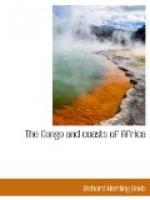[Illustration: “Tenants” of
Leopold, Who Claims that the Congo
Belongs to Him, and that These Native People
Are There Only as His
Tenants.]
This, then, is the “open door” as I find it to-day in the Congo. It is an incredible state of affairs, so insolent, so magnificent in its impertinence, that it would be humorous, were it not for its background of misery and suffering, for its hostage houses, its chain gangs, its chicottes, its nameless crimes against the human body, its baskets of dried hands held up in tribute to the Belgian blackguard.
III
THE CAPITAL OF THE CONGO
Leopold’s “shop” has its front door at Banana. Its house flag is a golden star on a blue background. Banana is the port of entry to the Congo. You have, no doubt, seen many ports of Europe—Antwerp, Hamburg, Boulogne, Lisbon, Genoa, Marseilles. Banana is the port of entry to a country as large as Western Europe, and while the imports and exports of Europe trickle through all these cities, the commerce of the Congo enters and departs entirely at Banana. You can then picture the busy harbor, the jungle of masts, the white bridges and awnings of the steamers. By the fat funnels and the flags you can distinguish the English tramps, the German merchantmen, the French, Dutch, Italian, Portuguese traders, the smart “liners” from Liverpool, even the Arab dhows with bird-wing sails, even the steel, four-masted schooners out of Boston, U.S.A. You can imagine the toiling lighters, the slap-dash tenders, the launches with shrieking whistles.
Of course, you suspect it is not a bit like that. But were it for fourteen countries the “open door” to twenty millions of people, that is how it might look.
Instead, it is the private entrance to the preserves of a private individual. So what you really see is, on the one hand, islands of mangrove bushes, with their roots in the muddy water; on the other, Banana, a strip of sand and palm trees without a wharf, quay, landing stage, without a pier to which you could make fast anything larger than a rowboat.
In a canoe naked natives paddle alongside to sell fish; a peevish little man in a sun hat, who, in order to save Leopold three salaries, holds four port offices, is being rowed to the gangway; on shore the only other visible inhabitant of Banana, a man with no nerves, is disturbing the brooding, sweating silence by knocking the rust off the plates of a stranded mud-scow. Welcome to our city! Welcome to busy, bustling Banana, the port of entry of the Congo Free State.
[Illustration: The Facilities for Landing
at Banana, the Port of
Entry to the Congo, Are Limited.]




